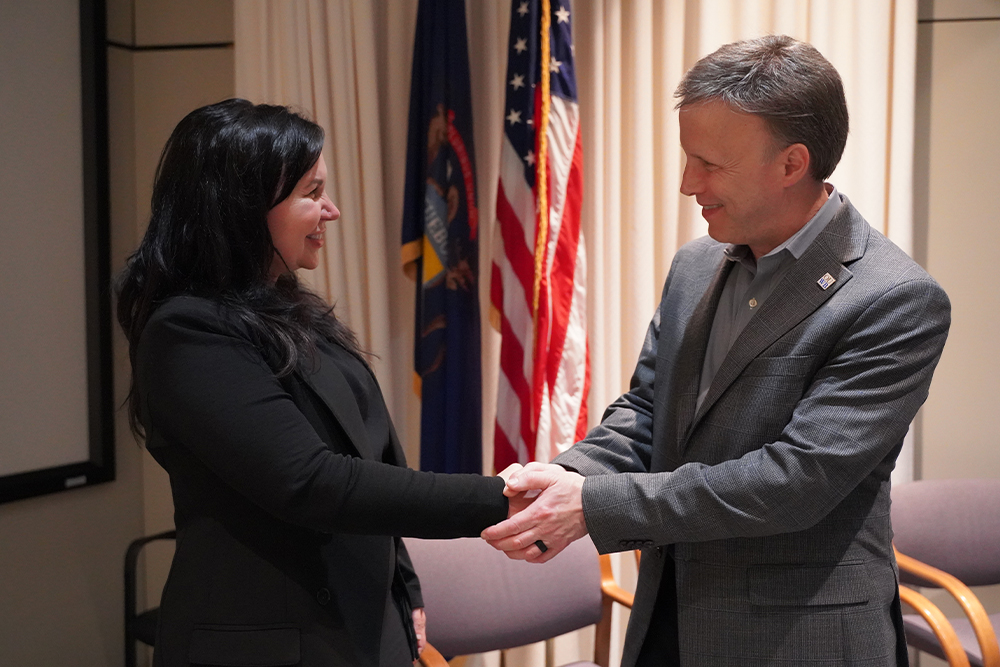Oakland University William Beaumont School of Medicine hosted the inaugural OUWB Research Seminar this week — an event that featured a prominent researcher from Duke University.
Held Aug. 14 at Corewell Health William Beaumont University Hospital in Royal Oak, about 50 people attended the event presented by the OUWB Office of Research and Center for Excellence in Medical Education. OUWB students, faculty, clinical faculty, and staff were in attendance.
The seminar featured Melissa Bauer, D.O., associate professor, Departments of Anesthesiology and Population Health Sciences, Duke University. Her presentation was “Partnering with Community to Reduce Material Morbidity and Mortality from Sepsis.”
Bauer talked about maternal sepsis and how it is a leading cause of maternal mortality and morbidity. She highlighted the fact that most cases occur outside of the hospital and detailed how working with patients and other members of the community is critical.
“I hope (attendees) took away the importance of working with patients and community,” Bauer said after her presentation. “I also hope that they took away that we need to just be very vigilant in listening to patients as much as we can so that we can help them with any condition that they might have.”
Bauer earned a doctorate in Osteopathic Medicine from Michigan State University and completed her residency in Anesthesiology at the University of Michigan.
Now at Duke, her research is centered on the early identification and treatment of maternal sepsis.
Since 2023, she has been a guest research faculty member in the National Center of Birth Defects and Developmental Disabilities at the Center for Disease Control. Bauer is funded as principal investigator by the National Institutes of Health.
She also serves on the Michigan Alliance for Innovation on Maternal Health Executive Committee.
During her presentation, Bauer defined maternal sepsis, which is a “life-threatening condition defined as organ dysfunction resulting from infection during pregnancy, childbirth, post-abortion, or postpartum period (up to 42 days).”
She also highlighted why it needs attention, relying in part on regional and national statistics. For example, Bauer noted that research from an eight-year period found that 73% of maternal sepsis-related deaths in Michigan were preventable. Overall, she said, it’s also among the top leading causes of maternal death in the U.S.
A huge problem, she noted, are delays in recognition, appropriate treatment, and escalation of care.
As a result, Bauer spent most of her presentation addressing ways health care professionals can help. She encouraged development of standardized screening tools, the use of bedside evaluations and labs, avoiding dismissing symptoms, the timely use of antibiotics, collaboration with care team members, and more.
Bauer highlighted several ways work has also been done to develop tools for patients: an educational handout that is now available in more than 80 languages and helps people identify symptoms; digital resources like a “badge buddy” with a QR code that can be shown to patients for them to scan; and general community dissemination strategies.
And she emphasized the importance of widespread education.
“We have to educate everybody … we really need to do that for our pregnant patients,” she said. “It’s not enough to teach the patient and their support person. We must teach everybody about it.”
Christopher Carpenter, M.D., Stephan Sharf Dean, called Bauer and the topic she spoke on a “phenomenal choice” for the school’s inaugural research seminar.
“Dr. Bauer is a well-respected researcher and she presented on a topic that had really broad multidisciplinary interests…obstetricians, maternal fetal medicine and population health experts, infectious disease doctors, internists, and people who work in public health,” he said.
“It’s a really great start,” he added.
Carpenter said another encouraging sign was the level of engagement from audience members. Among them was Matthew Sims, M.D., professor, Department of Internal Medicine, medical director of research, Corewell Health East, and director, Infectious Diseases Research, Corewell Health.
“Sepsis is a huge problem in general,” he said, noting the many challenges presented in identifying “normal” conditions associated with pregnancy versus what might be a symptom of sepsis.
“Recognition is a huge piece of this, so this is really important work,” he said. “And she’s a renowned expert in this field. This was a great talk.”
Richard Kennedy, Ph.D., associate dean, Research, OUWB, called Bauer and her presentation “perfect” for the inaugural event.
“First, she is a nationally recognized leader in the field,” he said. “Secondly, it had a good mixture of community engagement, which is reflective of OUWB’s mission, vision, and values.”
“We successfully picked a topic that’s near and dear to the hearts of the clinicians and scientists we have at OUWB and Corewell Health,” he added.
For more information, contact Andrew Dietderich, senior marketing specialist, OUWB, at [email protected].
To request an interview, visit the OUWB Communications & Marketing webpage.
This work is licensed under a Creative Commons Attribution-NonCommercial 4.0 International License.


